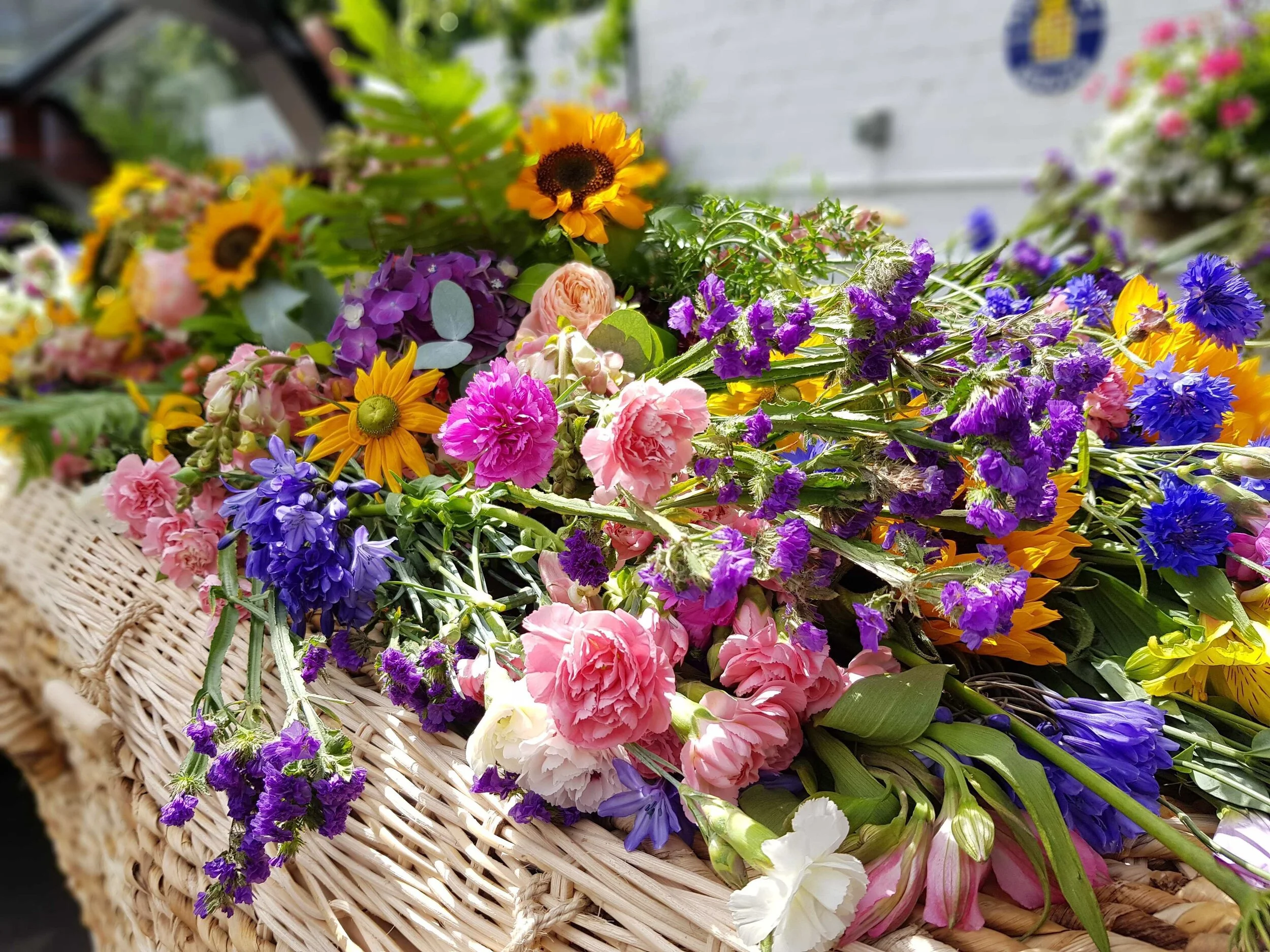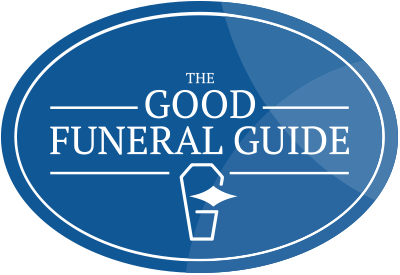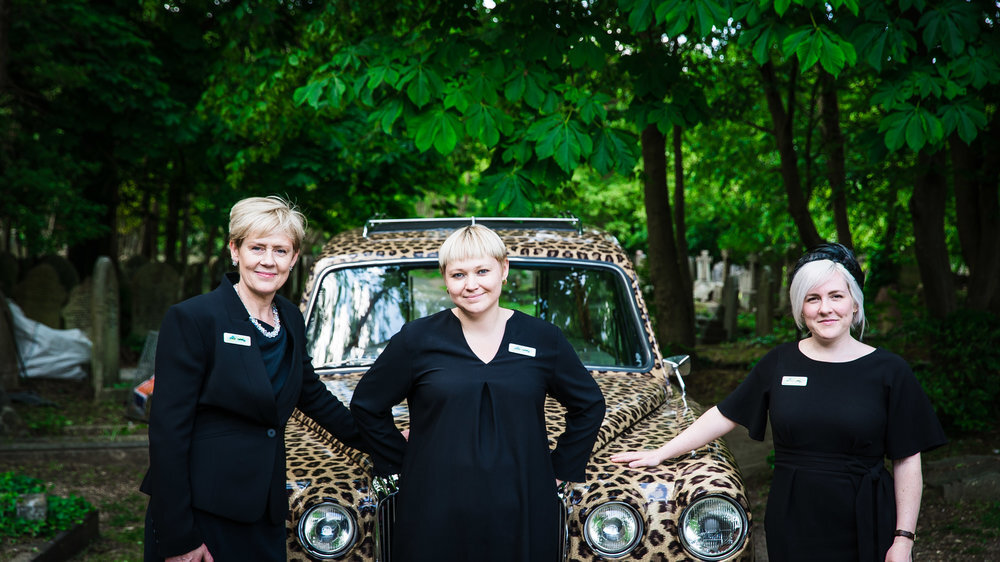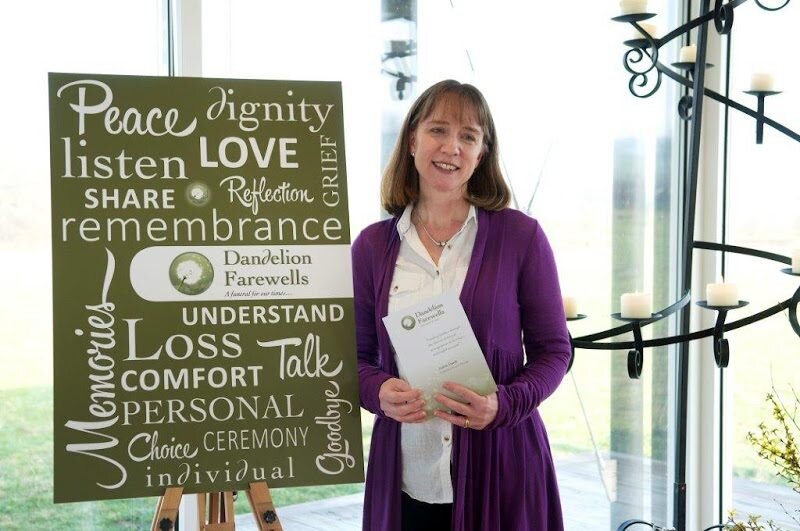Arranging a Funeral
If you’re looking for support and guidance because someone you know is dying or has died, please accept our condolences. This page has been put together by funeral director Louise Winter (the co-founder of Life. Death. Whatever. and the founder of Poetic Endings) to support and guide you to arrange a funeral that works for you.
Copyright © Sacred Stones Ltd 2018
First steps
There are different things you’ll need to do, depending on where the person has died.
Please note, the information below is relevant to England and Wales.
At home
When someone dies at home and it’s expected, a doctor will need to certify the death. Sometimes this will be the person's registered GP, sometimes it will be the on-call doctor. After someone has died, you can have some time with them, if you want to do so. You may want to play some music and light a candle. There’s no rush to call a funeral director straight away.
If the death was expected, the GP will then provide a medical certificate showing the cause of death, which you will need to register the death.
At a nursing home
When someone dies in a nursing home, a doctor will need to certify the death. Sometimes this will be the person's registered GP; sometimes it will be the on-call doctor. Once a doctor has certified the death, the nursing home may require that the person is collected straight away, although not always. If the death was expected, the GP will provide a medical certificate showing the cause of death, which you will need to register the death.
In hospital or hospice
If the person has died in hospital or hospice, you'll liaise with the bereavement team who will offer practical and emotional support. The person who has died will usually be cared for in the mortuary at the hospital or hospice until a funeral director is appointed or alternative arrangements are made.
If someone dies unexpectedly
If someone dies unexpectedly or if they haven’t been seen by their GP in the last 14 days, their death will be reported to the coroner, who may request a post-mortem or inquest.
Registering the death
You’ll need to make an appointment at your local register office to register the death within five days. You’ll need to take the certificate showing the cause of death, signed by a doctor. If you have their birth certificate, NHS medical card or number and marriage or civil partnership certificates, it’s helpful to take them.
You’ll be issued with a certificate for burial or cremation (often called the green form) and a death certificate (a copy of the entry made by the registrar in the death register). This certificate is needed to deal with money or property left by the person who has died, including dealing with the will. You may need several copies of this certificate as various authorities will want to see it (such as banks and life insurance companies.)
The Government’s website provides helpful information about how to handle the administration following a death.
Choosing the right funeral director for you
You may wish to appoint a funeral director to take care of the person who has died and to make arrangements for the funeral, although using a funeral director is not a legal requirement in the UK. All funeral directors are different, so it’s important to choose someone who feels right for you.
Don’t be pressured into appointing a funeral director straight away. There’s no rush to make any decisions. Give yourself some time to consider how you’d like to approach arranging the funeral. Just because the person who has died is already in the care of a funeral director (usually because a nursing home has called a funeral director on your behalf), doesn’t mean you have to use them to arrange the funeral. You can change your mind and appoint someone else.
You might want to read the many Five Things about funerals, particularly Five Things I wish everyone knew about funerals, by the CEO of the Good Funeral Guide, Fran Hall.
If you’re looking for a good funeral director in your area, the Good Funeral Guide will be able to help.
If you’ve read the Life. Death. Whatever. book and you’re looking for a funeral director with a similar approach, we’ve put together a list of the friends and colleagues around the UK who we highly recommend because:
They will give you the time and space to work out the right funeral for you
They won’t upsell or push you to buy things you don’t need
They list their services and fees online and believe in price transparency
They value the funeral ceremony and will work with you to get it right
They don’t routinely embalm the people in their care
They will invite you to be as involved as you feel comfortable - washing and dressing the person who has died, carrying the coffin etc
They will communicate with you gently and sensitively and will answer your questions honestly
They’re all independent companies led by emotionally intelligent, kind and thoughtful people who really understand the value of a good funeral
DIY/ Home funerals
Using a funeral director is not a legal requirement. You can do everything from collecting the person who has died from the mortuary to taking care of them at home, transporting them to the funeral, and even arranging a burial or cremation. If you’re looking to carry out the funeral yourself, or you’d like the support of a Home Funeral Guide, contact the Home Funeral Network, DIY Funerals UK or the Natural Death Centre. They will be able to provide guidance and advocate on your behalf, when required.
Direct cremation
Direct cremation is when the person who has died is collected from the place of death and cremated with no funeral. It has become increasingly popular in recent years with people who don’t want to have a funeral ceremony. You can read more about it here.
If you don’t want to have a funeral but don’t want a direct cremation, it may be better to opt for a simple funeral where you choose the elements that work for you. If you work with a flexible funeral director, they’ll be able to facilitate this for you. For example, it may be important for you to spend time with the person who has died, but not important that they are transported to the funeral in a hearse followed by limousines. You don’t need to buy an entire funeral package from a funeral director. You can work with someone who can facilitate the elements that are important to you.
The funeral service
Where will the funeral take place?
Crematorium
You don’t have to go to the local crematorium or the crematorium closest to your funeral director. You can visit and have a look around before you make a decision.
Natural burial grounds
Woodland and natural burial grounds can provide a more peaceful setting for a funeral. They’re often set in beautiful locations and some have ceremonial halls on site.
Alternative venues
Funerals don’t have to take place in a church or a crematorium. There are no laws stating where a funeral can be held. You can hold the service outside of the crematoria or church. Community halls, theatres and historic houses may work well for you but check that they will allow the coffin to be there, if that’s important to you. You can even hold the funeral at home or in your garden. There’s a guide to alternative funeral venues in London here.
The funeral ceremony or service
If you decide to have a funeral service, you’ll need to make some decisions about the kind of service and who you would like to lead it.
Will it be a celebration of life or a funeral? Will it solemn? Upbeat? Informal? Formal? A good funeral can honour the person who has died, whilst serving the needs of those left behind. The process of putting the funeral together can help with your grief. Sitting down with friends and family to share stories, taking time to write a tribute or eulogy or gathering photos for the wake can be as important as the funeral itself.
Religious services
A religious service will follow the traditions of your chosen faith and will follow a fixed format.
The Church of England has a helpful website which provides lots of information about funerals. The Art of Dying Well has a useful collection of Catholic prayers.
Funeral celebrants
Funeral celebrants will facilitate the funeral that you’d like to have based on your beliefs, not theirs. The funerals they put together are created especially for you. They can usually include elements of religion such as prayers and hymns, if that's what you want. A good celebrant will visit you at home and spend time talking at length about the person who has died before putting together the funeral.
If you or someone you know feels capable of leading the funeral service, you may want to put together the funeral yourself or appoint a celebrant to assist you.
There are many different kinds of celebrants with different styles and approaches. It’s important that you feel that the celebrant is the right person for you. Have a chat with a few celebrants to see if they're the right choice for you before appointing them as your celebrant. You don’t need to use the celebrant the funeral director has recommended.
If you’re in London, you might want to look at the Poetic Endings’ Celebrant Directory to find a celebrant who works to a high standard and can help you to put together the funeral you want.
If you’re not in London, the following resources can help you to find the right celebrant for you:
After the Funeral
Find support
After the funeral can be the most vulnerable time when you’re grieving. You may find that your support network disappears as life returns to normal for everyone else. Friends may stop phoning and relatives stop popping by with offers of help. This can be the most vulnerable time when you’re grieving.
Grief can be messy, complicated and painful. Contrary to popular belief, it doesn’t come in neatly defined stages. The idea of ‘getting over it’ isn’t unhelpful. There’s no one-size-fits-all prescription.
Useful resources:
Read the many Five Things about grief on our website. Reading other people’s experiences can really help. You may even be inspired to write you own.
Julia Samuel’s book Grief Works is a refreshingly helpful and modern approach to grief. She has many helpful suggestions as to how to build pillars of strength that enable people experiencing loss to rebuild their lives, in their own time.
The Good Grief Trust exists to help those who are grieving in the UK. The charity aims to be there for anyone who has been bereaved by acknowledging grief and providing reassurance, a virtual hand of friendship and ongoing support. If you’re struggling and need support and guidance, you can find specialist help by looking at the directory on their helpful website.
Megan Devine’s Refuge in Grief is a helpful resource. It’s been described as ‘grief support that doesn’t suck’.



















Final Journey was created by Tracy Lazonby. She is the person who you will deal with from the first phone call through to the time after the funeral, when she can suggest local support groups if needed.
Website